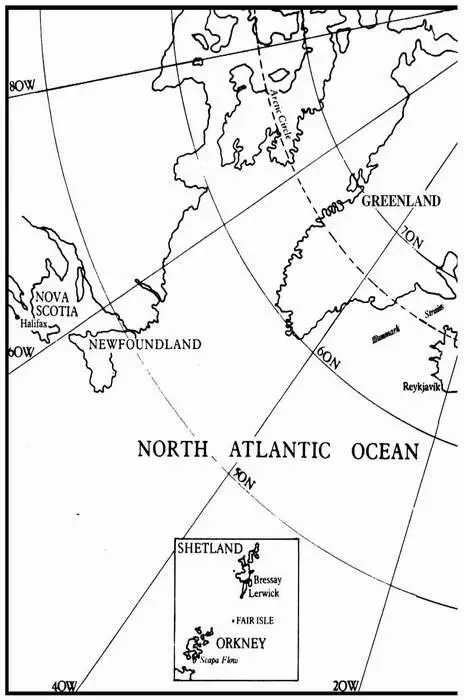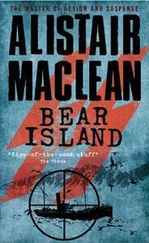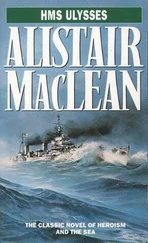Alistair Maclean
San Andreas
To David and Judy
Cover Page
Title Page Alistair Maclean San Andreas
Dedication To David and Judy
Map
Prologue
Chapter One
Chapter Two
Chapter Three
Chapter Four
Chapter Five
Chapter Six
Chapter Seven
Chapter Eight
Chapter Nine
Chapter Ten
Chapter Eleven
Chapter Twelve
Chapter Thirteen
About The Author
By Alistair MacLean
Copyright
About the Publisher

There are three distinct but inevitably interlinked elements in this story: the Merchant Navy (officially the Mercantile Marine) and the men who served in it: Liberty Ships: and the units of the German forces, underseas, on the seas and in the air, whose sole mission was to seek out and destroy the vessels and crews of the Merchant Navy.
1 At the outbreak of war in September 1939 the British Merchant Navy was in a parlous state indeed—‘pitiable’ would probably be a more accurate term. Most of the ships were old, a considerable number unseaworthy and some no more than rusting hulks plagued by interminable mechanical breakdowns. Even so, those vessels were in comparatively good shape compared to the appalling living conditions of those whose misfortune it was to serve aboard those ships.
The reason for the savage neglect of both ships and men could be summed up in one word—greed. The fleet owners of yesteryear—and there are more than a few around today—were grasping, avaricious and wholly dedicated to their high priestess—profits at all costs, provided that the cost did not fall on them. Centralization was the watchword of the day, the gathering in of overlapping monopolies into a few rapacious hands. While crews’ wages were cut and living conditions reduced to barely subsistence levels, the owners grew fat, as did some of the less desirable directors of those companies and a considerable number of carefully hand-picked and favoured shareholders.
The dictatorial powers of the owners, discreetly exercised, of course, were little short of absolute. Their fleets were their satrap, their feudal fiefdom, and the crews were their serfs. If a serf chose to revolt against the established order, that was his misfortune. His only recourse was to leave his ship, to exchange it for virtual oblivion, for, apart from the fact that he was automatically blackballed, unemployment was high in the Merchant Navy and the few vacancies available were for willing serfs only. Ashore, unemployment was even higher and even if it had not been so, seamen find it notoriously difficult to adapt to a landlubber’s way of life. The rebel serf had no place left to go. Rebel serfs were very few and far between. The vast majority knew their station in life and kept to it. Official histories tend to gloss over this state of affairs or, more commonly, ignore it altogether, an understandable myopia. The treatment of the merchant seamen between the wars and, indeed, during the Second World War, does not form one of the more glorious chapters in British naval annals.
Successive governments between the wars were perfectly aware of the conditions of life in the Merchant Navy—they would have had to be more than ordinarily stupid not to be so aware—so successive governments, in largely hypocritical face-saving exercises, passed a series of regulations laying down minimum specifications regarding accommodation, food, hygiene and safety. Both governments and owners were perfectly aware—in the case of the ship-owners no doubt cheerfully aware—that regulations are not laws and that a regulation is not legally enforceable. The recommendations—for they amounted to no more than that—were almost wholly ignored. A conscientious captain who tried to enforce them was liable to find himself without a command.
Recorded eyewitness reports of the living conditions aboard Merchant Navy ships in the years immediately prior to the Second World War—there is no reason to question those reports, especially as they are all so depressingly unanimous in tone—describe the crews’ living quarters as being so primitive and atrocious as to beggar description. Medical inspectors stated that in some instances the crews’ living quarters were unfit for animal, far less human, habitation. The quarters were invariably cramped and bereft of any form of comfort. The decks were wet, the men’s clothes were wet and the mattresses and blankets, where such luxuries were available, were usually sodden. Hygiene and toilet facilities ranged from the primitive to the non-existent. Cold was pervasive and heating of any form—except for smoking and evil-smelling coal stoves—was rare, as, indeed was any form of ventilation. And the food, which as one writer said would not have been tolerated in a home for the utterly destitute, was even worse than the living quarters.
The foregoing may strain the bounds of credulity or, at least, seem far-fetched, but respectively, they should not and are not. Charges of imprecision and exaggeration have never been laid at the doors of the London School of Hygiene and Tropical Medicine or the Registrar General. The former, in a pre-war report, categorically stated that the mortality rate below the age of fifty-five was twice as high for seamen as it was for the rest of the male population, and statistics issued by the latter showed that the death rate for seamen of all ages was 47% in excess of the national average. The killers were tuberculosis, cerebral hæmorrhage and gastric or duodenal ulcers. The incidence of the first and last of those is all too understandable and there can be little doubt that the combination of those contributed heavily to the abnormal occurrence of strokes.
The prime agent of death was unquestionably tuberculosis. When one looks around Western Europe today, where TB sanatoria are a happily and rapidly vanishing species, it is difficult to imagine just how terrible a scourge tuberculosis was just over a generation ago. It is not that tuberculosis, worldwide, has been eliminated: in many underdeveloped countries it still remains that same terrible scourge and the chief cause of death, and as recently as the early years of this century TB was still the number one killer in Western Europe and North America. Such is no longer the case since scientists came up with the agents to tame and destroy the tubercle bacillus. But in 1939 it was still very much the case: the discovery of the chemotherapeutic agents, rifampin, para-aminosalicylic acid, isoniazid and especially streptomycin, still lay far beyond a distant horizon.
It was upon those tuberculosis-ridden seamen, ill-housed and abominably fed, that Britain depended to bring food, oil, arms and ammunition to its shores and those of its allies. It was the sine qua non conduit, the artery, the lifeline upon which Britain was absolutely dependent: without those ships and men Britain would assuredly have gone under. It is worth noting that those men’s contracts ended when the torpedo, mine or bomb struck. In wartime as in peacetime the owners protected their profits to the bitter end: the seaman’s wages were abruptly terminated when his ship was sunk, no matter where, how, or in what unimaginable circumstances. When an owner’s ship went down he shed no salt tears, for his ships were insured, as often as not grossly over-insured: when a seaman’s ship went down he was fired.
The Government, Admiralty and ship-owners of that time should have been deeply ashamed of themselves: if they were, they manfully concealed their distress: compared to prestige, glory and profits, the conditions of life and the horrors of death of the men of the Merchant Navy were a very secondary consideration indeed.
Читать дальше













